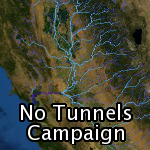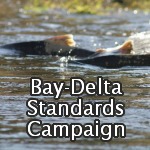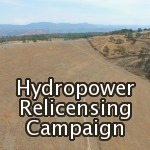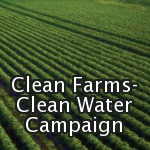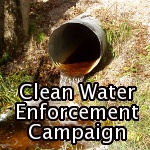By Bill Jennings, CSPA Executive Director
The California Sportfishing Protection Alliance (CSPA) has submitted extensive comments on the draft Programmatic Environmental Impact Report (PEIR) for the Central Valley Regional Water Quality Control Board’s (Regional Board) irrigated lands project that regulates waste discharges from some eight million acres of farmland to surface and groundwater. The PIER violates the most basic requirements of the California Environmental Policy Act (CEQA). Based upon it, Regional Board staff proposes to essentially continue a failed conditional waiver program that ignores water quality, the law and common sense. The proposed program is little more than a license to irrigated agriculture to continue to use our rivers and streams as sewers, which has contributed to the present catastrophic decline of fisheries.
The program requires farmers to join coalitions and conduct limited water quality monitoring. However, requirements to implement pollutant control measures are voluntary. The structure of the program precludes the Regional Board from learning the identity of specific dischargers, actual discharge locations, the constituents being discharged, the volume and concentration of discharged pollutants, whether or not management measures to reduce or eliminate pollution have been implemented or if implemented management measures are effective. Consequently, the Regional Board cannot and will not be able to document a single specific source of pollution, the implementation and effectiveness of a single control measure or identify a single pound of pollution that has actually been prevented from entering waterways.
Since the coalitions are legally fictitious entities shielding actual dischargers, the Regional Board is unable to employ its traditional regulatory enforcement powers against actual dischargers to compel compliance with the conditions of the conditional waiver. Regulation of the largest source of pollution to Central Valley waterways has effectively been delegated to the voluntary goodwill of groups of dischargers. Such an approach has never worked in the past and is not likely be successful in the future.
Irrigated agriculture is the largest source of pollution to Central Valley waterways. According to the Region Board’s 2007 Review of Monitoring Data for the Irrigated Lands Conditional Waiver Program, data collected from 313 sites throughout the Central Valley between 2003 and 2007 showed toxicity to aquatic life was present at 63% of the sites monitored for toxicity (50% were toxic to more than one species). Pesticide water quality standards were exceeded at 54% of sites monitored for pesticides (many for multiple pesticides). One or more metals violated criteria at 66% of the sites monitored for metals. Human health standards for bacteria were violated at 87% of sites monitored for coliform. More than 80% of the locations reported exceedances of general parameters (dissolved oxygen, pH, salt, TSS). While the adequacy of monitoring (i.e., frequency and comprehensiveness of monitoring) varied dramatically from site to site, the report presented a dramatic panorama of the epidemic of pollution caused by the discharge of agricultural wastes.
In 1982, the Central Valley Regional Water Quality Control Board (Regional Board), issued waivers exempting eight million acres of farmland from having to meaningfully comply with the state’s Porter-Cologne Water Quality Control Act. In 1999, CSPA and Deltakeeper were instrumental in proposing and securing a new state law (SB 390) that sunset existing waivers and required re-adoption every five years, beginning in 2003. In 2000, CSPA and Deltakeeper petitioned and subsequently sued the Board over the obsolete and water quality-damaging waivers. Following lengthy administrative proceedings, the Regional Board issued new “conditional waivers” for irrigated lands in 2003 and again in 2006. CSPA again sued over both of the adopted waivers and secured a date certain for finalization (March 2011) of an EIR to comply with CEQA.
A new program to regulate waste discharges from farms must be in place before the present waivers sunset in June 2011. Given the deplorable state of Central Valley waterways and crashing fisheries, it is imperative that irrigated agriculture be required to comply with pollution reduction requirements applicable to every other segment of society; i.e., municipalities, industry and mom-and-pop businesses.
Our comments on the PEIR represent another step in CSPA’s campaign to require farmers to comply with reasonable requirements to control pollutant discharges from their lands. Over the coming months, we’ll be working with a coalition of fishermen, environmentalists and the general public to bring irrigated agriculture under an effective regulatory umbrella.



